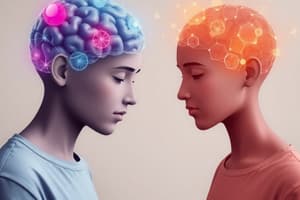Podcast
Questions and Answers
What is a primary difference between cognitive and emotional intelligence regarding performance prediction?
What is a primary difference between cognitive and emotional intelligence regarding performance prediction?
- Emotional intelligence is irrelevant to performance prediction.
- Cognitive intelligence predicts teamwork performance better.
- Emotional intelligence predicts individual task performance better.
- Cognitive intelligence is a better predictor of individual tasks. (correct)
Why do we study perception according to the content provided?
Why do we study perception according to the content provided?
- To prove that perception and reality are the same.
- To encourage uniform thinking among individuals.
- To gather data on cognitive intelligence.
- To understand how individuals interpret events. (correct)
Which statement best describes stereotyping in the context of perception?
Which statement best describes stereotyping in the context of perception?
- It involves recognizing individual traits irrespective of group identity.
- It requires communication with individuals before making assumptions.
- It is based solely on factual and observable characteristics.
- It incorrectly assigns similar traits to all members of a group. (correct)
What common outcome could result from differing perspectives in the workplace?
What common outcome could result from differing perspectives in the workplace?
How do individuals generally categorize people according to the provided content?
How do individuals generally categorize people according to the provided content?
What does self-efficacy primarily refer to in the workplace?
What does self-efficacy primarily refer to in the workplace?
How does self-esteem positively impact workplace behavior?
How does self-esteem positively impact workplace behavior?
Which of the following best describes the locus of control?
Which of the following best describes the locus of control?
What aspect of self-concept does our declaration of being 'not good' at something reflect?
What aspect of self-concept does our declaration of being 'not good' at something reflect?
Which statement reflects high self-efficacy?
Which statement reflects high self-efficacy?
Study Notes
Performance Predictors
- Cognitive intelligence predicts performance on individual tasks.
- Emotional intelligence predicts performance in teamwork environments.
Understanding Perception
- Perception involves organizing and interpreting impressions to create meaning.
- Behavior is shaped by perceptions rather than objective reality.
- The way we view the world is critical to our behavior.
Importance of Studying Perception
- Studying perception helps understand how conclusions about events are reached.
- We rarely see reality directly; instead, we interpret it, influencing our actions and beliefs.
Categorization and Stereotyping
- People categorize others based on characteristics like nationality or profession.
- Favorable traits are often assigned to one's own group versus less favorable to others.
- Workplace conflicts often arise from differing perspectives and perceptions.
Stereotyping Impacts
- Stereotyping involves attributing the same traits to all members of a group.
- Self-concept influences how we perceive and interact in professional settings.
Self-Esteem
- Self-esteem is the belief in one's own worth and competence.
- High self-esteem leads to resilience against external influences and better decision-making.
- Statements of personal capability reflect confidence levels.
Self-Efficacy
- Self-efficacy is the belief in one's abilities to succeed in specific situations.
- High self-efficacy correlates with a positive mindset and accomplishment in tasks.
Locus of Control
- Internal locus means belief in personal control over life's events.
- External locus attributes control to outside circumstances like fate or luck.
- Internals tend to be more successful and satisfied, while externals may face higher absenteeism.
Social Identity
- Social self is defined by group memberships, enhancing a sense of belonging.
- Identifying with groups can improve self-esteem and workplace dynamics.
Self-Concept Effects
- Self-concept influences motivation, decision-making, stress management, and leadership qualities.
- Complexity, consistency, and clarity of self-concept boost individual well-being.
Personality
- Personality shapes interactions, preferences, decisions, and motivations.
- It serves as an enduring framework for guiding behaviors.
Values and Behavior
- Decisions are linked to core values based on situational appropriateness and logical reasoning.
- Awareness of personal values affects workplace behavior and decision-making.
Value Congruence
- Value congruence occurs when personal values align with organizational values, enhancing job satisfaction.
Perception Issues
- Stereotyping can create biases that distort decision-making and behavior.
- Educating about biases can mitigate stereotyping effects.
Self-Fulfilling Prophecy
- Expectations about others can influence their behavior, aligning with initial perceptions.
- Positive expectations can lead to positive outcomes, while negative expectations can hinder performance.
Improving Perception
- Awareness of biases helps mitigate their impact.
- Enhancing self-awareness allows for more open-minded interactions.
- Engagement in meaningful interactions fosters empathy and understanding.
Key Takeaway
- Understanding perception is essential for effective leadership and improving interpersonal relationships in various contexts.
Studying That Suits You
Use AI to generate personalized quizzes and flashcards to suit your learning preferences.
Description
Explore the findings of Offerman et al. (2004) regarding cognitive and emotional intelligence. Understand how these types of intelligence impact performance in individual tasks versus team settings. This quiz will also cover the processes of perception and reality in behavior.




